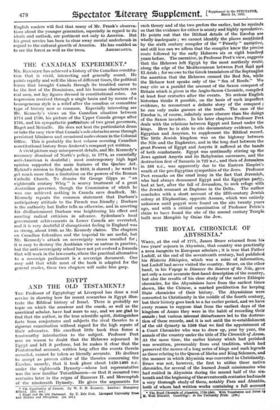EGYPT AND THE OLD TESTAMENT.t
THE Professor of Egyptology at Liverpool has done a real service in showing how far recent researches in Egypt illus- trate the Biblical history of Israel. There is probably no topic on which the amateur and the crank, as well as the uncritical scholar, have had more to say, and we are glad to find that the author, in the true scientific spirit, distinguishes facts from conjectures and subjects the rival theories to a rigorous examination without regard for the high repute of their advocates. His , excellent little book thus forms a trustworthy introduction to the subject. Professor Peet sees no reason to doubt that the Hebrews sojourned in Egypt and left it perforce, but he makes it clear that the Pentateuchal account, written long after the events therein recorded, cannot be taken as literally accurate. He declines to accept as proven either of the theories concerning the Exodus, namely, that it took place about 1450-1400 n.c. under the eighteenth Dynasty—whose last representative was the now familiar Tutankhamen—or that it occurred two centuries later in the reigns of Rameses II. and Meremptah 'of the nineteenth Dynasty. He gives the arguments for • The Constitution of Canada- By W. P. M. Kennedy. London: Humphrey Milford. [25s. net.] t Egypt and the Old 2'sstamenf. By T. lrio Peet. laVaSP001 Haiverteil Fran and Hodder and Stoughton. [5s. net.]
each theory and of the two prefers the earlier, but he reminds_ us that the evidence for either is scanty and highly speculative.
He points out that the Biblical details of the Exodus are wholly inadequate ; we cannot identify the places mentioned by the sixth century compiler of the " Priestly " narrative, and still less can we affirm that the compiler knew the precise route followed by the early Hebrews six or eight hundred years before. The narrative, in Professor Peet's view, suggests
that the Hebrews left Egypt by the most northerly route, along the edge of the Mediterranean between Port Said apd El Arish ; for we owe to the Greek translators of the Septuagint the assertion that the Hebrews crossed the Red Sea, while the Hebrew text speaks only of the " Sea of Reeds." We may cite as a parallel the account of the Saxon conquest of Britain which is given in the Anglo-Saxon Chronicle, compiled at least four centuries after the events. No serious English historian thinks it possible, on the basis of such imperfect evidence, to reconstruct a definite story of the conquest ; he can only make guesses at the truth. The case of the Exodus is, of course, infinitely more obscure than the doingS of the Saxon invaders. In his later chapters Professor Peet deals with the relations between Egypt and Israel under the kings. Here he is able to cite documentary evidence, both Egyptian and Assyrian, to supplement the Biblical record. The little Jewish kingdom was on the highway between the Nile and the Euphrates, and in the long duel between the great Powers of Egypt and Assyria it suffered at the hands of both combatants. Egypt was continually stirring up the Jews against Assyria and its Babylonian successors, and the destruction first of Samaria in 722 "Lc., and then of Jerusalem in 586 n.c., was apparently due to the Eastern Empire's wrath at the pro-Egyptian sympathies of the Jews. professor Peet remarks on the cruel irony in the fact that Jeremiah, who had always denounced Egypt and the Egyptian party, had at last, after the fall of Jerusalem, to seek refuge with the Jewish remnant at Daphnae in the Delta. The author concludes with a short account of the fifth-century Jewish colony at Elephantine, opposite Assuan, which was entirely unknown until papyri were found on the site twenty years ago, and with a critical examination of Professor Petrie's claim to have found the site of the second century Temple built near Memphis by Onias the Jew.


































































 Previous page
Previous page